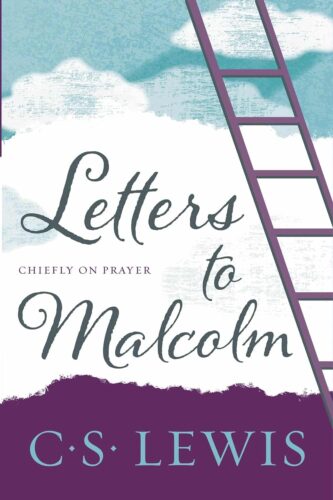 A Disconnected, Yet Still Sublime C.S. Lewis Addition
A Disconnected, Yet Still Sublime C.S. Lewis Addition
Author: C.S. Lewis
Letters to Malcom: Chiefly on Prayer is a posthumously published collection of Lewis’s letters to a fictional friend. It is written not as an instruction, but more as a meditation, a collection of private notes and asides.
Lewis thoughtfully discusses prayer with his fabled friend, Malcom, taking prayer out of the rote asking, while admitting to our imperfections and desire to be better than we are. Lewis shines a light on the relationship prayer invites between ourselves and God, like talking to a friend, and notes some basic dos and don’ts of prayer (be truthful, be open, be comfortable sharing our needs and fears with God, dedicate a time and a place, mediate, and so forth), while also engaging in the mystery of life and the answers we sometimes do or do not receive.
“One of the purposes for which God instituted prayer may have been to bear witness that the course of events is not governed like a state but created like a work of art to which every being makes a conscious contribution, and in which every being is both a means and an end.”
Lewis also has a few memorable words to say about prayer without words and the feelings and emotions behind prayer, not the ritual. He moves on to share some asides about the formation of churches and services, how meaningful and deep wins out over the constant human desire to create something different to make it interesting. These nuggets, disconnected as they sometimes are, and often interrupted with other ideas, when extracted, taken, and meditated on, certainly hold a depth to them. It’s common-sense advice, albeit a bit difficult to find and clearly understand.
And that leads me to my next point – Letters to Malcom was a mixed bag, despite the prayer advice and wisdom. It’s not traditional Lewis. Indeed, it is far more lofty, more philosophical, and less “dumbed down.” This makes it difficult to draw connections between the free-flowing thoughts and ideas that converged, sometimes, on prayer and then later diverged into random topics.

Image by Airgil Daviss from Pixabay
The first time I listened to Letters to Malcom I was excited; it’s Lewis, after all, and was part of my assigned November reading for the C.S. Lewis Fellowship, a yearlong intensive course of reading, studying, and working in groups to fully commit and live for Jesus Christ. I quickly became disenchanted though. It was hard to follow, hard to concentrate, a hodgepodge of topics (like any letter), and Malcom’s answers and arguments are unheard (at the time, I thought these were real collected letters, so it felt justified.) I followed, after a book break, by listening again, trying to be more careful. I understood a bit more, yet a lot slipped past me, mostly because of the shifting nature of the narrative, the mostly stream-of-conscious, letter writing style, and the highbrow metaphysical concentration.
Nevertheless, despite my inability to fully enter the wonderful world of Lewis this time, Letters to Malcom still has some thoughtful and impactful prayer advice. The fact that Lewis himself admitted that prayer was hard for him – sometimes disheartening (why aren’t all our prayers answered), sometimes tedious, always mysteries and often used to avoid real action – was a relief. If Lewis, one of the greatest Christians of our time (arguably any time) finds prayer difficult (sometimes admittedly boring), then I am not as bad off as I had thought.
“I haven’t any language weak enough to depict the weakness of my spiritual life. If I weakened it enough it would cease to be language at all. As when you try to turn the gas-ring a little lower still, and it merely goes out.”
– Frances Carden
Follow my reviews on Twitter at: https://twitter.com/xombie_mistress
Follow my reviews on Facebook at: https://www.facebook.com/FrancesReviews
- Book Vs Movie: The Shining - April 6, 2020
- Thankful For Great Cozy Mysteries - December 13, 2019
- Cozy Mysteries for a Perfect Fall - October 20, 2019


